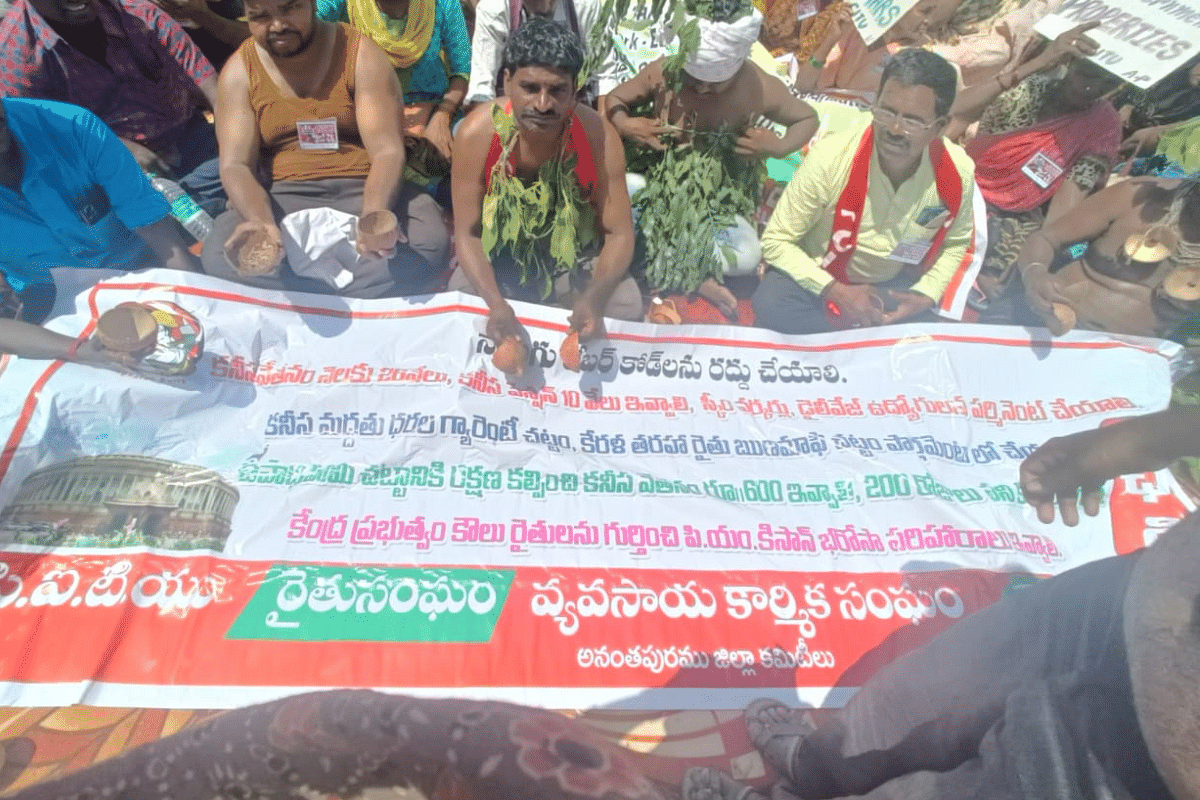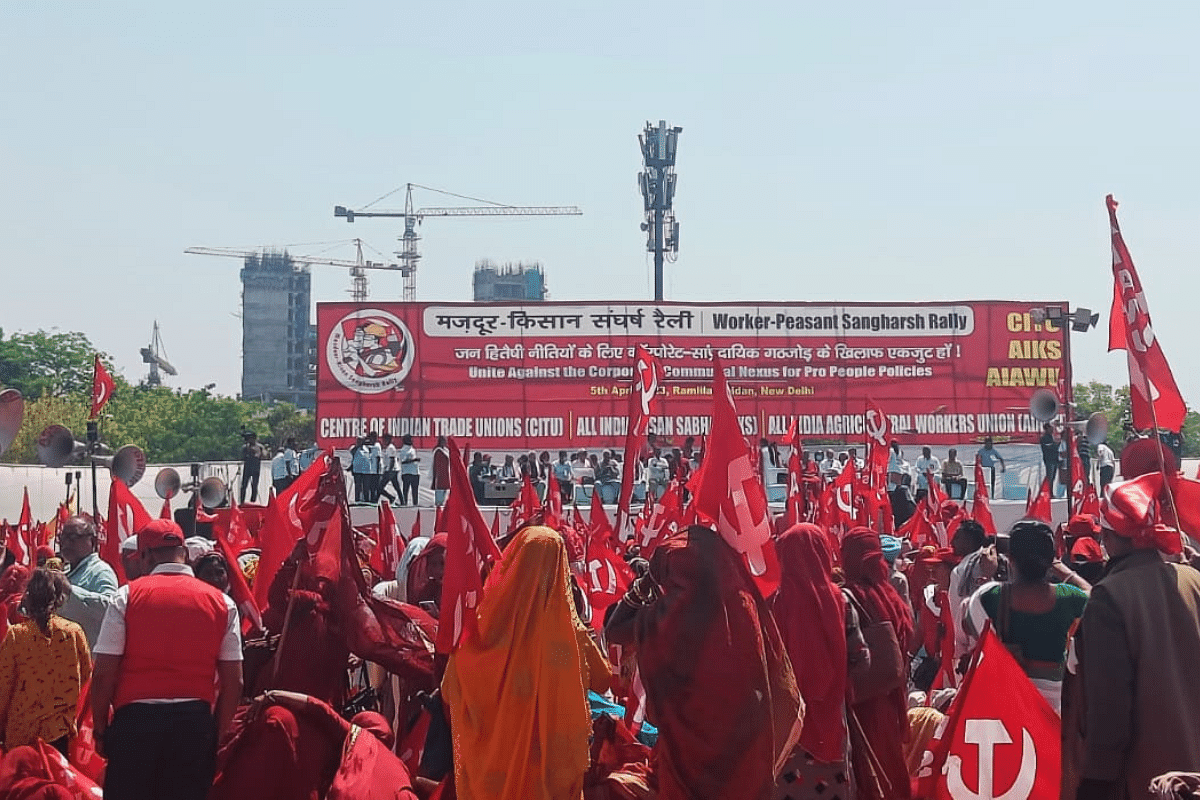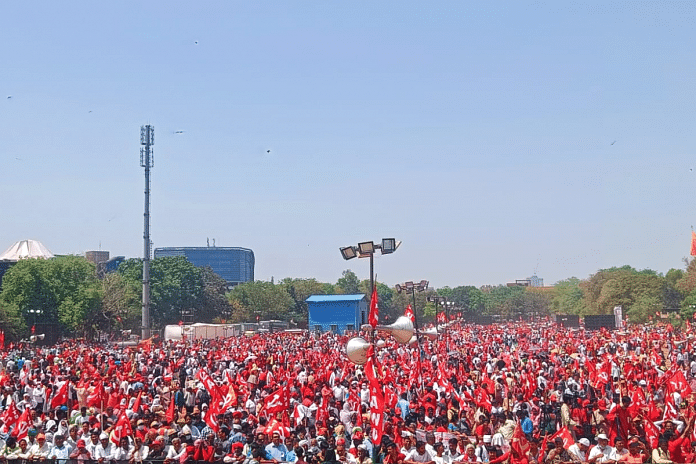New Delhi: As thousands of farmers and workers descended on the Ramlila Maidan demanding access to education, healthcare, and a dignified life, the ground, which turned into “a sea of red”, was a sight to witness.
Among the participants was 35-year-old Jamuni (who goes by one name), an ASHA worker from Rourkela, Odisha, whose central question was “how do we run our families?”
“We do all the work and yet don’t get paid. Sometimes, there is no work, so there is no guarantee that there will be money. How do we then run our families? All we demand is to increase our wages and give us leaves. On most days, we work all day. We are not robots, are we?” she told ThePrint.
The Ramlila Maidan Wednesday became the stage for a massive rally where farmers and workers from a vast cross-section joined hands to raise demands like minimum support price (MSP) according to the Swaminathan Commission for farmers, roll-back of four labour codes for workers, and more work under the Mahatma Gandhi National Rural Employment Guarantee Scheme.
The protest — called the ‘Mazdoor Kisan Sangharsh’ rally — was led by the Centre for India Trade Union (CITU), the All India Kisan Sabha (AIKS) and the All India Agricultural Workers Union (AIAWU), among others.
At the rally, the participants registered their protest against inflation and unemployment, while seeking a basic wage, and every now and then, slogans rent the air. One went, “Kaun layega inquilab, Bharat ke mazdoor kisaan (Who will bring revolution, India’s workers and farmers)”
Abdul Rasheed (40) travelled all the way from Shopian in Kashmir to Delhi for the rally.
An apple farmer who has suffered “uncountable losses”, Rasheed said, “For 14 days, the NH-44 was closed by the government. We could not sell our crops even when they were ready. Apples were sold from Himachal Pradesh. Having kept them for so long, the wholesale rates went down. Where we could have sold one carton for Rs 1,000, we did so for Rs 200-300.”
Rasheed had joined the protest as a member of the Apple Federation of India — one of the participating organisations.
Speaking to ThePrint, Vijoo Krishnan, AIKS general secretary said, “These were promises on which the government had come to power. They had promised employment, reduced prices. Would there be a sea of people today, in this heat, all the way to Delhi, had their needs been met?”

According to A.R. Sindhu, general secretary of the All India Federation of Anganwadi Workers and Helpers (AIFAWH), and national Secretary of the CITU, it is the farmers’ issues that should become the major agenda for the Lok Sabha elections next year.
Explaining the motive behind the rally, Sindhu said, it is to bring together a collective platform to raise the issues of the masses so that it can reflect in policy changes.
“Villages operate in a different manner alongside caste and class divisions. If a Dalit worker goes to talk to an upper caste, his demands will not be heard. We have tried to bring all workers together on a single platform so that their issues form the agenda of the upcoming elections. The government has taken back the farm laws, but none of the other demands has been met,” Sindhu added.
She was referring to the government’s decision to roll back 3 controversial farm laws following a relentless agitation by farmers in 2020-21.
ThePrint reached the ministers of agriculture — Cabinet minister Narendra Singh Tomar and ministers of state Shobha Karandlaje and Kailash Choudhary — through calls but is yet to receive a response. Comment on the rally is also awaited from J.P. Singh Mattu, the spokesperson for the labour ministry, who was reached by call and messages.
Also Read: SKM facing factionalism, rebellions in unions. What it means for farmers’ movement
Demand for employment
Kanchan Devi, 45, from Sultanpur, Haryana, was almost in tears. “Our crops were entirely destroyed. We do not have a house or electricity. The government had promised a house under PM Awas Yojna, but they never gave one,” she told ThePrint.
Most of the workers at the site ThePrint spoke to said the government had turned a blind eye to their problems.
“We put up 3-4 bulbs in our field and the bills go as much as Rs 10,000. No one checks it by the meter. Then when we can’t pay, the electricity is cut off. The crops are ours, but the government puts a price on them. The government is not doing anything for us,” she said.

The other issue that united many on the ground was minimum wages.
For 39-year-old Sumitra Devi, an anganwadi worker from Chhattisgarh, the rally is a “call for justice”.
“During the pandemic, we risked our lives and yet never took a day’s break. It was our duty, but we barely got paid. We did not get leaves, but were we spared by the pandemic? Everyone in my family was affected. Twice, the state government promised to increase wages but that is yet to happen. No one seems to listen,” she said.
Surmayee Baruah, 32, said midday meal providers in Assam were “paid only Rs 1,500 for our work”. “I have been working for 10 years and it is the same wage. We have come to protest against it.”
Commenting on the issue, Badal Saroj, joint secretary of AIKS, said, “We are demanding Rs 26,000 minimum wage for workers because they need it. This includes health and other resources.”
Saroj highlighted that, for MSP, the Swaminathan report had suggested a formula which, if applied, could lead to fewer farmer suicides.
“The BJP, in its 2014 manifesto, had promised to implement it. This included the labour wage, the cost of production, price of seeds and rent of land to be provided to the farmer along with 60 per cent of what they earn through this. But it was not done,” he claimed.
The question should not be to make lives worse for those who create resources, but to help make them better, Saroj said, adding, “If you keep reducing their income, what will they do? The fight is to ensure better lives going ahead.”
Also Read: ‘Silent majority’ of farmers support farm laws, repeal would be ‘unfair’, panel had told SC
Against privatisation
Many workers ThePrint interacted with cited concerns about privatisation and how “public sector undertakings (PSUs) were being destroyed systematically”.
“After 2014, sectors working under public-private-partnership (PPP) have been affected,” said a 40-year-old former BSNL employee from Amritsar.
“PSUs were destroyed systematically. We were in stiff competition. Now, they want to sell our towers and optical fibres,” he said, referring to the government’s plans for the partial monetisation of towers and optical fibres. “When these should be the issues to focus on, we are sold communal agendas. We are all the same when it comes to work,” he added.
Saroj agreed. “Banks and public institutions are made of public money and act as safety valves during economic crises. We saw it that insurance companies and banks survived the 2008 inflation and helped keep economic stability. Private banks do not have that accountability.” he added.
Biplab Acharya, State General Secretary of the Union Bank Employees Association West Bengal and Sikkim, had similar concerns. “Every sector has been privatised, be it steel, coal or telecom. It is very difficult for those of us who are middle class. Now there is a hire and fire system. We need unions to survive.”
(Edited by Richa Mishra)
Also Read: Farm workers protest near Punjab CM Mann’s house over wages, police resort to lathi-charge



